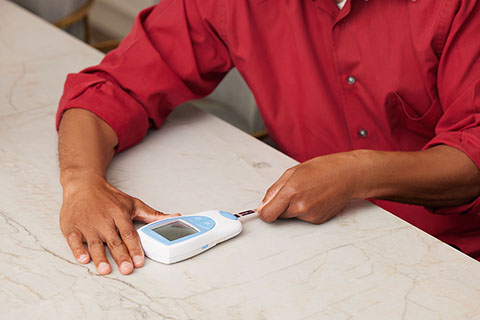Up to three million people take prescription blood thinners to protect their hearts. These anticoagulants prevent your blood from clotting and reduce the risk of a heart attack by ensuring your blood pumps smoothly.
The benefit of this medication is clear, but like all prescriptions, there can be side effects. By thinning your blood, the risk of bleeding or having a stroke increases. Regularly testing your blood's international normalized ratio (INR) level can keep you safe and your treatment on track.
The importance of INR testing
INR testing tracks how long it takes for your blood to clot. An INR of 1.1 is standard in healthy people, and from 2.0 to 3.0 is generally an acceptable range if you take warfarin. When your INR is above the recommended range, it means blood is clotting too slowly, while a lower ratio indicates your blood is clotting too quickly. Taking a test weekly allows you and your healthcare provider to track your health and ensure your blood thinners are working correctly.
Home INR testing
When you first start taking anticoagulants, your practitioner may consider you for home INR self-testing. INR testing is simple, and you will be able to complete the test from home.
Running blood tests on a home INR testing meter is a simple, user-friendly process that takes a matter of minutes. Your INR testing meter comes with a lancet to prick your finger to collect a small blood sample. You place the sample on a test strip, insert it into the INR meter, and the machine calculates the results almost immediately. You can then send your results directly to mdINR via phone call or the mdINR Mobile Application (Apple or Google).
Additional benefits of INR testing frequency include:
Why do I need a weekly INR test?
Performing an INR test is an easy method of quickly and accurately measuring your INR values. Real-time insight into your INR levels can help prevent health complications caused by your heart condition or blood thinners. By running a test weekly, your practitioner can monitor your health quickly and conveniently.
- Fewer doctor visits: Routinely running these tests yourself is more convenient than regularly visiting a practitioner or clinic. Pick a time that works for you each week . Weekly testing is especially beneficial if you have trouble leaving home for extended periods or have limited transportation access.
- Building healthy habits: Research shows that conducting more frequent tests can help you avoid serious cardiac complications. Testing your INR levels each week will help you take a more active role in your cardiac health, encouraging you to improve your overall health through better sleep, diet, and exercise.
- Less stress: Understanding your heart health is a natural stress reducer. You do not have to wait weeks to visit the lab for testing to learn the results. Home INR tests empower you with the knowledge you need to live each day to the fullest.
Get your INR tests
Anticoagulants are proven to promote better heart health, and the team at mdINR will work closely with you and your practitioner to mitigate any potential complications.
You are supplied with everything you need for easy self-testing, including:
- A portable testing device
- Testing supplies
- One-on-one training to help you accurately test your PT/INR value
- Highly qualified and compassionate clinical specialists who are available 24/7 to answer questions and help you succeed in your treatment
Disclaimer: INR testing services are provided by our affiliate mdINR.


